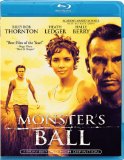| Reviews & Columns |
|
Reviews DVD TV on DVD Blu-ray 4K UHD International DVDs In Theaters Reviews by Studio Video Games Features Collector Series DVDs Easter Egg Database Interviews DVD Talk Radio Feature Articles Columns Anime Talk DVD Savant Horror DVDs The M.O.D. Squad Art House HD Talk Silent DVD
|
DVD Talk Forum |
|
|
| Resources |
|
DVD Price Search Customer Service #'s RCE Info Links |
|
Columns
|
|
|
Monster's Ball
Lionsgate Home Entertainment // R // November 4, 2008
List Price: $29.99 [Buy now and save at Amazon]
The Film:
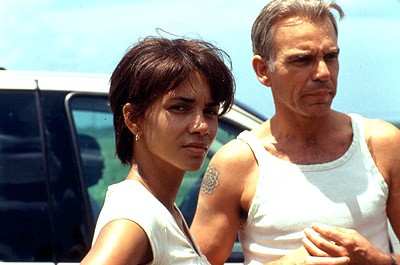 Monster's Ball quickly rose to fame around '02 for two reasons: Halle Berry's win for Best Actress at the Academy Awards, along with her participation in a fairly lurid sex scene that doubles as a major pivot point in the picture. Despite the fact that it received marks for Original Screenplay and Picture at several film festivals, it became largely overshadowed because of its other allures that, ultimately, planted moviegoers in their seats. Something that gets shuffled around a bit is that Monster's Ball, recognized in many venues and festivals for its screenplay, introduced Marc Forster to the cinematic world -- a director who has become a strong surrealist filmmaker due to his success with Finding Neverland and Stranger than Fiction.
Monster's Ball quickly rose to fame around '02 for two reasons: Halle Berry's win for Best Actress at the Academy Awards, along with her participation in a fairly lurid sex scene that doubles as a major pivot point in the picture. Despite the fact that it received marks for Original Screenplay and Picture at several film festivals, it became largely overshadowed because of its other allures that, ultimately, planted moviegoers in their seats. Something that gets shuffled around a bit is that Monster's Ball, recognized in many venues and festivals for its screenplay, introduced Marc Forster to the cinematic world -- a director who has become a strong surrealist filmmaker due to his success with Finding Neverland and Stranger than Fiction.
His talent shines through in Monster's Ball in a way that crafts the film into a compelling and affective drama. His visually-concentrated style adds sumptuous tones to the mood that act as welcome yet misaligned forces, ones that fight a bit with the gritty reality of the content. One undeniable fact about Forster's talent, however, is that he's able to pull extraordinary performances from unlikely sources -- something that he accomplishes in spades with Halle Berry.
Set in the Deep South, Monster's Ball pivots around racism and capital punishment as it follows the execution of a transformed, artsy convict named Lawrence Musgrove (Sean "P-Diddy" Combs, A Raisin in the Sun). Corrections officer Hank (Billy Bob Thornton, The Man Who Wasn't There) is sandwiched between opposing influences while arranging his electrocution, dealing with the vitriol brimming from his bigoted retired father (Peter Boyle, Taxi Driver) -- a former corrections officer himself -- and his accepting, emotionally active son (Heath Ledger, Brokeback Mountain) who has been building a relationship with the inmate. Tossed back and forth between racist anecdotes and tolerance, Hank finally has to confront the full complexity of his inherent mannerisms once he's forced into a happenstance association with waitress Leticia (Halle Berry, Jungle Fever) -- Lawrence's down-and-out wife and mother to his overweight child.
To offset the harsh tones lying within the film, Marc Forster tries to build Monster's Ball into a sumptuous artistic experience by way of eye-catching visuals from his always-outstanding cinematographer Roberto Schaefer. His visual design creates subtle flickers of delicacy that almost suggest sweetness in a bitter environment, especially when matched with Asche and Spencer's haunting and evocative score. It crafts a more mildly-tempered experience than you'd expect, filled with emphasis on rich minutiae and symbolism behind elements like Hank gently washing blood off of leather and the empty space behind integral characters as they sit, pondering. There's a lot of reflection and theory underneath Forster's well-conceived attractiveness, which inches it away from delivering potent punch after potent punch and further towards being a placid, thoughtful tale of optimism within soul-wrenching circumstances -- which becomes a two-edged sword considering the hard-hitting poise of Milo Addica and Will Rokos' script.
The glue that helps those conflicting components in Monster's Ball stick together is Halle Berry, who delivers an exceedingly worthy performance bubbling over the rim with anguish. But it's despite the film's "call to fame", not because of it. Her sex scene with Billy Bob Thornton, from start to finish, becomes an intoxicating yet excessive climax that lingers passed the point of triumph well into the spectrum of both emotional and titillating overplay. Outside of that erotic little box, however, Berry's strength comes in subtle dialogue delivery and physical nuance that speaks volumes of Leticia when her distressed words lack coherence. Her softer scenes become the reasons why she earned her accolades, because following her heartbreaking plummet becomes involving and empathetic.
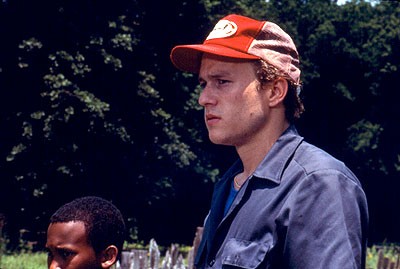 She's also counterbalanced in the same categories by Billy Bob Thornton, who believably sells Hank's transition from overshadowed backwater bigot to normalcy and civility. Together they share a bizarre chemistry that ignites just the right amount of spark, one that melds and churns along with Peter Boyle and Heath Ledger's understated performances as the Grotowski clan with a surprising level of zeal. Following their gradation becomes the real thematic draw, as little inklings from both father and son soak into Hank's personality in ways that help to support his emotional malleability. Leticia's presence acts as both an erratic catalyst and an emotional core, while Hank's awakening amid a whirlwind of familial trouble and misguided hatred becomes the focal point of the film's fuming anger.
She's also counterbalanced in the same categories by Billy Bob Thornton, who believably sells Hank's transition from overshadowed backwater bigot to normalcy and civility. Together they share a bizarre chemistry that ignites just the right amount of spark, one that melds and churns along with Peter Boyle and Heath Ledger's understated performances as the Grotowski clan with a surprising level of zeal. Following their gradation becomes the real thematic draw, as little inklings from both father and son soak into Hank's personality in ways that help to support his emotional malleability. Leticia's presence acts as both an erratic catalyst and an emotional core, while Hank's awakening amid a whirlwind of familial trouble and misguided hatred becomes the focal point of the film's fuming anger.
Monster's Ball aims to express a weathered, painful sense of optimism with Leticia and Hank's growth -- most important being the numerous ways that the characters find comfort in bad situations -- and it slams them home in a way that constructs the film into a middle-ground blend between compassion and harshness. Cinematic elements recur and resonate throughout the film in ways that elicit humanistic similarities between unlikely sources, all the while emphasizing their differences through mangled sociological traits. It's interesting -- every character in Monster's Ball seems to be smack dab in the middle of an internal transition period, except for the grieving woman who has endured the bleakest of human torment from the lot. She suffers, weeps, and quakes to her core in pain, but still comes across as the most assured and steadfast. Forster's film is one where you arrive for Berry's performance as the saddened-yet-enduring Leticia, but slowly become more impressed as you begin see the complexity and resonance presented around the actress' billowing accomplishment.
The Blu-ray:
Video and Audio:
Lionsgate have done a solid job with several of their mainstream Blu-ray titles, but Monster's Ball displays a purely mediocre image by way of a cluster of issues attached to its 1080p, AVC-encoded Blu-ray transfer. Most noticeable are a scattering of blips, dots, and hairline damage on the 2.35:1 print, along with quite a few instances of edge enhancement against the contours of several actors in the film. A few of these haloed edges can be distracting at normal viewing levels, creating a mild glow around their contours that looks unnatural. They're especially noticeable when the corrections officers do anything within the stark prison-white walls of the facility, as well as during the scene with Leticia and her son on execution day, showing a full-blown halo during several instances -- as well as some overly noisy backdrops that can be distracting.
Other scenes -- like the visitation room sequence with Sean Combs and his family -- go the opposite direction, displaying highly-detailed and enhancement-free scenarios that look very good. Clothing grains and environment textures display strong detail, all through a natural haze that pumps the visual style with life. Taking visual style into consideration, Monster's Ball renders the somewhat flat, undersaturated nature of the film with a few strengths as well. Strong contrast competence displays proper dimensionality and depth of field, all in ways that preserve the natural, sun-baked nature to the film's interior, exterior, and even nighttime shots. It's a decent transfer, one that steps well above its standard-definition counterpart in detail but suffers from a few other shaky instances of HD image weakness.
On the audio side, Monster's Ball gets a bump to a DTS HD Master Audio presentation that cradles the dialogue and outstanding score with sufficient depth. Without question, the best element of the track is the score, one that fills the soundstage with graceful, reserved magnetism. It helps to carry the emotionally-active film from point to point, though there are plenty of spans where it merely sits behind the character interaction. Verbal clarity also comes across with top-shelf audibility, only reaching a mildly difficult pitch when Heath Ledger talks in a pre-Ennis southern draw. The only elements that sound a little weak are some sound effects, especially hollowed slaps and rainfall effects that stretch to the rear channels properly -- but lack in ambiance. Others, like the slamming of a porch door and the firing of a rifle, sound a lot better. A few steps are taken to take it above mediocre levels, crafting a sound design with the high-resolution that track supports the aural elements properly. Optional English and Spanish subtitles are available to accompany the English Master Audio track.
Special Features:
Commentary from director Forster and writers Addica and Rokos:
Casual and insightful, this track places a lot of emphasis on the comparisons between script-to-screen and Forster's own symbolic tricks. The director operates almost as a moderator for the trio, sparking questions from them about their feelings on shooting locations, seeing their script evolve into a film, and where their research on the environment spliced into their narrative. They talk about filming in the prison and about the death row footage, along with discussion on the film's two pinnacle scenes -- especially the Berry/Thornton sex scene. Enlightening, relaxed, and enjoyable, the three filmmakers keep their audience entertained and educated with this poised commentary.
Music from the Film: Monster's Ball (8:20, SD):
Accentuating the orchestration of the film's score, this featurette covers the texture and mood that the musicians and director Forster assembled for the picture. It jumps between the three composers, talking about their collaborative efforts in giving Monster's Ball a certain drive due.
Cast and Director Interviews (19:41, SD):
Twenty minutes of interviews are spliced together here, combining press junkets and on-set interview time to cover its topics. Focus falls on what drew the actors to the script, especially the prospect on working with a low-budget, harder-hitting picture. Thornton, Belly, Boyle, Ledger, Combs, and director Forster mix and match their content, staying concentrated for the cameras without seeming too much like back-slapping.
Behind the Scenes with Producer Lee Daniels (18:24, SD):
In the shadows for the entirety of the other special features, producer Daniels spends a lengthy amount of time having a conversation about his career and his involvement with Monster's Ball. He talks about finding Forster as the director, persuading the Lionsgate corporate suits to greenlight the picture, as well as some alternate casting decisions along the way. The most interesting portion of the discussion was the focus on Halle Berry and the filmmakers' reservations towards casting her -- a "beautiful actress" -- in the role. He also dives into the "African American responsibility" present in the conception of the film.
Also included are around four minutes of On the Set Footage (4:21, SD), a set of Deleted Scenes (4:05, SD), and a solidly-assembled Theatrical Trailer, presented in 1.78:1 standard-definition.
Final Thoughts:
Spearheaded by an outstanding cast and a independent-style energy bubbling from its story-driven script, Monster's Ball presents a drama that offers much more beyond its seemingly single-note analysis on racism and family relationships. While it has become noteworthy for a specific scene involving Thornton and Berry, there's much more to digest in Marc Forster's first high-profile character study -- and many more performances within the picture that outrank. As to be expected, Halle Berry's Academy Award-winning performance is outstanding, but Billy Bob Thornton and the rest of the actors portraying the focal male characters offer an equally potent level of demeanor complexity. It's a stunning and aesthetically beautiful film, even if it grows a bit overzealous in its excesses.
Lionsgate's Blu-ray presentation of Monster's Ball looks decent and sounds better, while also carrying over the extras from the standard-definition disc. Plenty of cast and crew commentary can be absorbed from the array of interviews, but the real intrigues comes in Lee Daniels' interview and the musical segment. Overall, this high-definition presentation of the film comes with a strong Recommendation, especially since the film carries more return value -- both aesthetic, thematic, and performance wise -- than expected.
Thomas Spurlin, Staff Reviewer -- DVDTalk Reviews | Personal Blog/Site
 Monster's Ball quickly rose to fame around '02 for two reasons: Halle Berry's win for Best Actress at the Academy Awards, along with her participation in a fairly lurid sex scene that doubles as a major pivot point in the picture. Despite the fact that it received marks for Original Screenplay and Picture at several film festivals, it became largely overshadowed because of its other allures that, ultimately, planted moviegoers in their seats. Something that gets shuffled around a bit is that Monster's Ball, recognized in many venues and festivals for its screenplay, introduced Marc Forster to the cinematic world -- a director who has become a strong surrealist filmmaker due to his success with Finding Neverland and Stranger than Fiction.
Monster's Ball quickly rose to fame around '02 for two reasons: Halle Berry's win for Best Actress at the Academy Awards, along with her participation in a fairly lurid sex scene that doubles as a major pivot point in the picture. Despite the fact that it received marks for Original Screenplay and Picture at several film festivals, it became largely overshadowed because of its other allures that, ultimately, planted moviegoers in their seats. Something that gets shuffled around a bit is that Monster's Ball, recognized in many venues and festivals for its screenplay, introduced Marc Forster to the cinematic world -- a director who has become a strong surrealist filmmaker due to his success with Finding Neverland and Stranger than Fiction. His talent shines through in Monster's Ball in a way that crafts the film into a compelling and affective drama. His visually-concentrated style adds sumptuous tones to the mood that act as welcome yet misaligned forces, ones that fight a bit with the gritty reality of the content. One undeniable fact about Forster's talent, however, is that he's able to pull extraordinary performances from unlikely sources -- something that he accomplishes in spades with Halle Berry.
Set in the Deep South, Monster's Ball pivots around racism and capital punishment as it follows the execution of a transformed, artsy convict named Lawrence Musgrove (Sean "P-Diddy" Combs, A Raisin in the Sun). Corrections officer Hank (Billy Bob Thornton, The Man Who Wasn't There) is sandwiched between opposing influences while arranging his electrocution, dealing with the vitriol brimming from his bigoted retired father (Peter Boyle, Taxi Driver) -- a former corrections officer himself -- and his accepting, emotionally active son (Heath Ledger, Brokeback Mountain) who has been building a relationship with the inmate. Tossed back and forth between racist anecdotes and tolerance, Hank finally has to confront the full complexity of his inherent mannerisms once he's forced into a happenstance association with waitress Leticia (Halle Berry, Jungle Fever) -- Lawrence's down-and-out wife and mother to his overweight child.
To offset the harsh tones lying within the film, Marc Forster tries to build Monster's Ball into a sumptuous artistic experience by way of eye-catching visuals from his always-outstanding cinematographer Roberto Schaefer. His visual design creates subtle flickers of delicacy that almost suggest sweetness in a bitter environment, especially when matched with Asche and Spencer's haunting and evocative score. It crafts a more mildly-tempered experience than you'd expect, filled with emphasis on rich minutiae and symbolism behind elements like Hank gently washing blood off of leather and the empty space behind integral characters as they sit, pondering. There's a lot of reflection and theory underneath Forster's well-conceived attractiveness, which inches it away from delivering potent punch after potent punch and further towards being a placid, thoughtful tale of optimism within soul-wrenching circumstances -- which becomes a two-edged sword considering the hard-hitting poise of Milo Addica and Will Rokos' script.
The glue that helps those conflicting components in Monster's Ball stick together is Halle Berry, who delivers an exceedingly worthy performance bubbling over the rim with anguish. But it's despite the film's "call to fame", not because of it. Her sex scene with Billy Bob Thornton, from start to finish, becomes an intoxicating yet excessive climax that lingers passed the point of triumph well into the spectrum of both emotional and titillating overplay. Outside of that erotic little box, however, Berry's strength comes in subtle dialogue delivery and physical nuance that speaks volumes of Leticia when her distressed words lack coherence. Her softer scenes become the reasons why she earned her accolades, because following her heartbreaking plummet becomes involving and empathetic.
 She's also counterbalanced in the same categories by Billy Bob Thornton, who believably sells Hank's transition from overshadowed backwater bigot to normalcy and civility. Together they share a bizarre chemistry that ignites just the right amount of spark, one that melds and churns along with Peter Boyle and Heath Ledger's understated performances as the Grotowski clan with a surprising level of zeal. Following their gradation becomes the real thematic draw, as little inklings from both father and son soak into Hank's personality in ways that help to support his emotional malleability. Leticia's presence acts as both an erratic catalyst and an emotional core, while Hank's awakening amid a whirlwind of familial trouble and misguided hatred becomes the focal point of the film's fuming anger.
She's also counterbalanced in the same categories by Billy Bob Thornton, who believably sells Hank's transition from overshadowed backwater bigot to normalcy and civility. Together they share a bizarre chemistry that ignites just the right amount of spark, one that melds and churns along with Peter Boyle and Heath Ledger's understated performances as the Grotowski clan with a surprising level of zeal. Following their gradation becomes the real thematic draw, as little inklings from both father and son soak into Hank's personality in ways that help to support his emotional malleability. Leticia's presence acts as both an erratic catalyst and an emotional core, while Hank's awakening amid a whirlwind of familial trouble and misguided hatred becomes the focal point of the film's fuming anger. Monster's Ball aims to express a weathered, painful sense of optimism with Leticia and Hank's growth -- most important being the numerous ways that the characters find comfort in bad situations -- and it slams them home in a way that constructs the film into a middle-ground blend between compassion and harshness. Cinematic elements recur and resonate throughout the film in ways that elicit humanistic similarities between unlikely sources, all the while emphasizing their differences through mangled sociological traits. It's interesting -- every character in Monster's Ball seems to be smack dab in the middle of an internal transition period, except for the grieving woman who has endured the bleakest of human torment from the lot. She suffers, weeps, and quakes to her core in pain, but still comes across as the most assured and steadfast. Forster's film is one where you arrive for Berry's performance as the saddened-yet-enduring Leticia, but slowly become more impressed as you begin see the complexity and resonance presented around the actress' billowing accomplishment.
The Blu-ray:
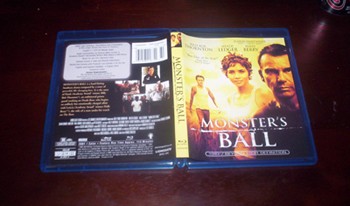 | 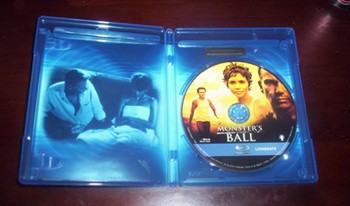 |
Video and Audio:
Lionsgate have done a solid job with several of their mainstream Blu-ray titles, but Monster's Ball displays a purely mediocre image by way of a cluster of issues attached to its 1080p, AVC-encoded Blu-ray transfer. Most noticeable are a scattering of blips, dots, and hairline damage on the 2.35:1 print, along with quite a few instances of edge enhancement against the contours of several actors in the film. A few of these haloed edges can be distracting at normal viewing levels, creating a mild glow around their contours that looks unnatural. They're especially noticeable when the corrections officers do anything within the stark prison-white walls of the facility, as well as during the scene with Leticia and her son on execution day, showing a full-blown halo during several instances -- as well as some overly noisy backdrops that can be distracting.
Other scenes -- like the visitation room sequence with Sean Combs and his family -- go the opposite direction, displaying highly-detailed and enhancement-free scenarios that look very good. Clothing grains and environment textures display strong detail, all through a natural haze that pumps the visual style with life. Taking visual style into consideration, Monster's Ball renders the somewhat flat, undersaturated nature of the film with a few strengths as well. Strong contrast competence displays proper dimensionality and depth of field, all in ways that preserve the natural, sun-baked nature to the film's interior, exterior, and even nighttime shots. It's a decent transfer, one that steps well above its standard-definition counterpart in detail but suffers from a few other shaky instances of HD image weakness.
On the audio side, Monster's Ball gets a bump to a DTS HD Master Audio presentation that cradles the dialogue and outstanding score with sufficient depth. Without question, the best element of the track is the score, one that fills the soundstage with graceful, reserved magnetism. It helps to carry the emotionally-active film from point to point, though there are plenty of spans where it merely sits behind the character interaction. Verbal clarity also comes across with top-shelf audibility, only reaching a mildly difficult pitch when Heath Ledger talks in a pre-Ennis southern draw. The only elements that sound a little weak are some sound effects, especially hollowed slaps and rainfall effects that stretch to the rear channels properly -- but lack in ambiance. Others, like the slamming of a porch door and the firing of a rifle, sound a lot better. A few steps are taken to take it above mediocre levels, crafting a sound design with the high-resolution that track supports the aural elements properly. Optional English and Spanish subtitles are available to accompany the English Master Audio track.
Special Features:
Commentary from director Forster and writers Addica and Rokos:
Casual and insightful, this track places a lot of emphasis on the comparisons between script-to-screen and Forster's own symbolic tricks. The director operates almost as a moderator for the trio, sparking questions from them about their feelings on shooting locations, seeing their script evolve into a film, and where their research on the environment spliced into their narrative. They talk about filming in the prison and about the death row footage, along with discussion on the film's two pinnacle scenes -- especially the Berry/Thornton sex scene. Enlightening, relaxed, and enjoyable, the three filmmakers keep their audience entertained and educated with this poised commentary.
Music from the Film: Monster's Ball (8:20, SD):
Accentuating the orchestration of the film's score, this featurette covers the texture and mood that the musicians and director Forster assembled for the picture. It jumps between the three composers, talking about their collaborative efforts in giving Monster's Ball a certain drive due.
Cast and Director Interviews (19:41, SD):
Twenty minutes of interviews are spliced together here, combining press junkets and on-set interview time to cover its topics. Focus falls on what drew the actors to the script, especially the prospect on working with a low-budget, harder-hitting picture. Thornton, Belly, Boyle, Ledger, Combs, and director Forster mix and match their content, staying concentrated for the cameras without seeming too much like back-slapping.
Behind the Scenes with Producer Lee Daniels (18:24, SD):
In the shadows for the entirety of the other special features, producer Daniels spends a lengthy amount of time having a conversation about his career and his involvement with Monster's Ball. He talks about finding Forster as the director, persuading the Lionsgate corporate suits to greenlight the picture, as well as some alternate casting decisions along the way. The most interesting portion of the discussion was the focus on Halle Berry and the filmmakers' reservations towards casting her -- a "beautiful actress" -- in the role. He also dives into the "African American responsibility" present in the conception of the film.
Also included are around four minutes of On the Set Footage (4:21, SD), a set of Deleted Scenes (4:05, SD), and a solidly-assembled Theatrical Trailer, presented in 1.78:1 standard-definition.
Final Thoughts:
Spearheaded by an outstanding cast and a independent-style energy bubbling from its story-driven script, Monster's Ball presents a drama that offers much more beyond its seemingly single-note analysis on racism and family relationships. While it has become noteworthy for a specific scene involving Thornton and Berry, there's much more to digest in Marc Forster's first high-profile character study -- and many more performances within the picture that outrank. As to be expected, Halle Berry's Academy Award-winning performance is outstanding, but Billy Bob Thornton and the rest of the actors portraying the focal male characters offer an equally potent level of demeanor complexity. It's a stunning and aesthetically beautiful film, even if it grows a bit overzealous in its excesses.
Lionsgate's Blu-ray presentation of Monster's Ball looks decent and sounds better, while also carrying over the extras from the standard-definition disc. Plenty of cast and crew commentary can be absorbed from the array of interviews, but the real intrigues comes in Lee Daniels' interview and the musical segment. Overall, this high-definition presentation of the film comes with a strong Recommendation, especially since the film carries more return value -- both aesthetic, thematic, and performance wise -- than expected.
|
| Popular Reviews |
| Sponsored Links |
|
|
| Sponsored Links |
|
|
| Release List | Reviews | Shop | Newsletter | Forum | DVD Giveaways | Blu-Ray | Advertise |
|
Copyright 2024 DVDTalk.com All Rights Reserved. Legal Info, Privacy Policy, Terms of Use,
Manage Preferences,
Your Privacy Choices | |||||||









